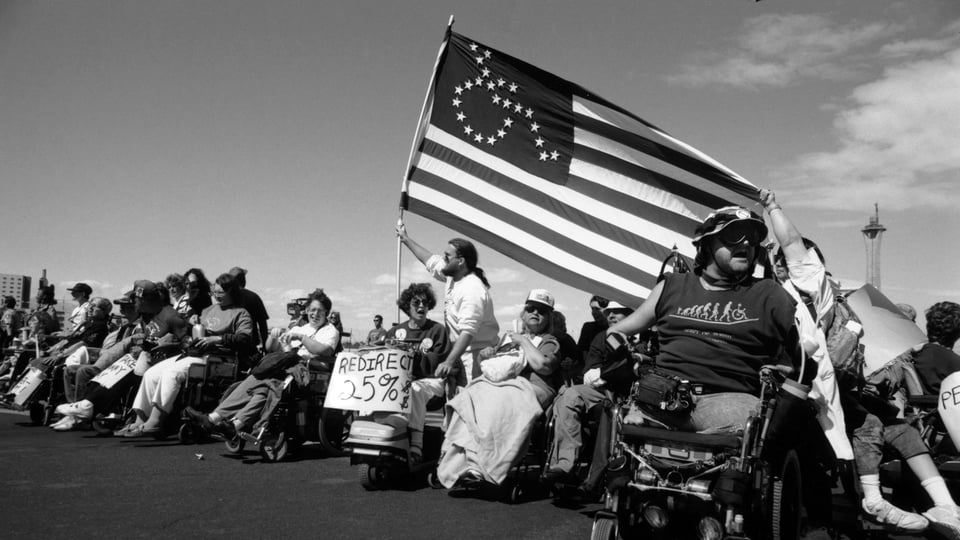Disability, Eugenics, and the Value of Human Life


Your worth is not tied to what you can do. Your worth is not tied to your health. Your worth is not tied to all the things you can do unassisted. Needing help does not make you worth less.
This week I’ve been repeating these phrases to myself in a more or less mantra-like fashion. I’ve felt the need to, after watching some particularly soul-scalding speeches from America’s grotesque caricatures of medical authority: RFK Jr, the failson conspiracy theorist now, somehow, in our nightmare world, the Health Secretary; and Dr. Oz, green coffee enema proponent, failed Senate candidate, and now Medicare-czar. “Your health is your personal responsibility,” he declared, artificially taut-skinned as a living bongo. RFK Jr., after spreading the gospel of measles by discouraging vaccination (and going! On the news! To obliquely blame! A child! For her own death! From measles! Because she was not “healthy”!), gave a speech that essentially dismissed the worth of those with autism. They’ll never pay taxes, he said. Never write a poem, fall in love, go to the bathroom unassisted. Of course, he blamed vaccines, which is so aggravatingly, horrifyingly, tentacularly stupid that it would (and has) generate several million columns’ worth of copy.
Beyond ignoring the many, many spectacular achievements of people on the autism spectrum, the core message of RFK and his ilk is that a life where you cannot do things unassisted is a scourge on society that must be eradicated. This is an unacceptable and hideous viewpoint. It is the viewpoint of someone who sees certain lives as inherently worth less than other lives.
The Sword and the Sandwich is a newsletter about deadly serious extremism and serious sandwiches. Please consider supporting this work with
a paid subscription.
Being a disabled person in America, in the gruesome end-run of its toxic individualism, you are always aware of an undercurrent of skepticism, and sometimes of outright hostility. This is particularly true when it comes to invisible disabilities, such as mental illness (my bugbear, agoraphobia, is on New York State’s list of disabling conditions). The general tenor of ignorant discourse is that you could cure yourself if you just tried harder. If you tried hard enough—with grit, will, bootstraps, crystals, oils, meditation, weed, sobriety, etc. etc.—and showed enough gumption, your brain would no longer hijack your nervous system at regular intervals. Therapy and medication don’t really count as trying in a lot of these conversations; they’re cheating; it’s about innate will and perseverance and character. (And, incidentally, trying to push through your disability more often than not causes tremendous pain, and some of it is irreparable.)
If your health is your responsibility, ill health is your fault. If disability is a burden on society, then each person who suffers ill health is a net detriment to society at large. That is the message of this administration, and it is a perspective both devoid of worth and capable of doing tremendous harm.
Comparisons, here, to the eugenics movement (which went semi-underground after World War II, but never really left) are more or less obvious. The line is straight, not even dotted. If some lives are worth less, are a problem to be solved, well, there is only one sort of solution to a problem that consists of living human beings. And it’s a final one.
People with visible disabilities face somewhat different challenges. What I’ve heard from friends and acquaintances is that there’s a mixture of pity, refusal to treat them as fully human, and occasional comments, directly to their faces, that their lives are not worth living because they, say, require a wheelchair for mobility.
Once you’ve had enough of these humiliating and painful conversations with friends, strangers and acquaintances, you begin to doubt your own value, too. If I can’t do these things that normal people do—if I can’t be productive in these ways that normal people are—what am I worth?

After many years of struggling to accept that I had a disability at all—that it would be in my life on a permanent basis; that I can hope for improvement, but not, after fifteen years, an overnight cure—I have found that asserting my worth is a scary thing, but a true thing. Simply because I live in a society that is critically bereft of any notion of collective responsibility for those who need aid; because I live in a mutilated country that dreams only of rugged solitude, a cowboy boot trampling on the throats of the weak forever; because I live in a moneyed country that nonetheless views social resources as a zero-sum game; doesn’t mean they’re right. It’s not right! If you need help, you are not worth less, no matter how many times that message comes from exalted podia or nosy assholes in the grocery store or family members or even from your own brain. You are in fact worth everything.
Many people come to recognize the universal value of human lives by dint of faith, and this can be a wonderful thing, although it can occasionally slip into the notion that God has put disabled people on earth to “inspire” others. Nonetheless many sincere expressions of religious faith speak of the value of the soul, which is an immutable currency, and transcends the ability of the body: each of us is endowed with this divine spark of worth.
For me, the reasoning is a bit simpler, and a bit more tautological. Ability is, more or less, a temporary state. Each of us comes into the world helpless, and we leave it helpless. Many of us—so many more than you think, more than you know—become temporarily or permanently in need of help along the way. It could happen to you tomorrow. It could happen to your loved one tomorrow. Ability is not a stable state, nor is it an indication of moral worth.
The eugenicists and their modern scions want to obscure this truth; they want to make people, living people, into plagues on society. But when the time comes, and you need help—when you require aid even for the simplest of things; when the things you take for granted become impossible—would you rather live in a country that understands this is part of the course of valuable and important human lives, or one that is eager to shove you into a ditch, to die at the side of the road?
If we make it so, life can be a broad path. There is room for all of us, those who lean on a proffered arm, those who stumble, those who wheel, those who lead the way—we all have our places on it. And to me, and I hope to you also, the broader path is worth fighting for.

As an able bodied worker, my life is shit. I see the disabled, the criminals on welfare, the group home people living a life of leisure, and I often wonder, should I just pretend to be crazy or my back hurts or something? Because being an able bodied worker is a shit deal.
In 2009, my wife slipped and fell and shattered her ankle. She was in a wheelchair for two months and then on crutches for two months, and it really gave both of us a huge insight into the struggles that permanently disabled people face in our society -- despite the ADA and generally better accommodations for disability than most countries in Europe. We considered ourselves to be fairly empathic, but it was a real eye-opener.
I have a good friend who is disabled through over-prescription of benzos and is slowly reclaiming her life. It's brutal to watch what she has to go through, just to be treated with basic decency -- for afflictions that are not at all her fault (she was one of the best software quality assurance workers I have ever met before her benzo dependency).
The vast majority of people in this country have absolutely no idea what life is like as a disabled person.
Years ago, when I still worked and was having migraines almost daily, two coworkers separately told me that if they had as many migraines as I did, they would kill themselves.
What are you even supposed to say to something like that? I just stared at them blankly.
The broader path is indeed worth fighting for and some of the most valiant people I know (at least virtually) are doing it from their beds. LC-X is a lifesaver for the rest of us who have fallen ill as a result of the current plague, and the people who continue to share credible scientific information and who write thoughtful long-form essays on the sociopolitical aspects of chronic disease states are my heroes.

Talia, Thank you for your well written piece. Dehumanizing people seems to be one of the goals of the current regime. It's important to have your voice reminding us that there's a different way.